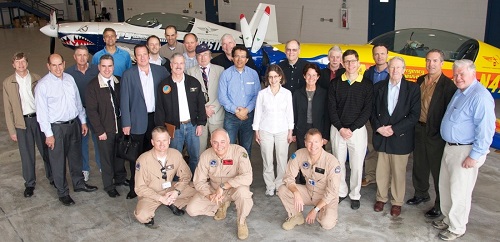Effort to Reduce Aviation Accidents Receives International Award

The leading cause of commercial aviation fatalities is loss of control in flight. Loss of control can be the result of environmental, system failure, or pilot-induced causes. Evidence indicates that pilots are often not properly trained to deal with this problem.
As part of an award-winning international committee, human factors experts including Drs. Judith Bürki-Cohen and Janeen Kochan have developed an approach to pilot training to reduce the number of flight accidents caused by loss of control.
This approach, known as Upset Prevention and Recovery Training (UPRT), includes a curriculum that combines academics and practical skills development. Pilots learn the causes of loss-of-control situations and how to recognize and avoid them. They are also trained on how to regain control of an airplane if a loss-of-control situation occurs.
“We have brought the subject of UPRT to the forefront of commercial aviation, providing our analysis of the problem and offering a roadmap of solutions for future implementation,” said Dr. Sunjoo Advani, chairman of the International Committee for Aviation in Extended Envelopes (ICATEE).
For this work, ICATEE has been awarded the Royal Aeronautical Society’s (RAeS) 2014 Specialist Team Bronze Award. Touting themselves as “the world’s most prestigious and long-standing aerospace awards honoring achievement, innovation, and excellence,” RAeS sets apart outstanding achievers in the global aerospace industry.
“I feel privileged to have worked with such an international group of experts who truly care about aviation safety and from whom I have learned so much,” Dr. Bürki-Cohen said.
